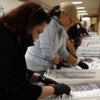Shutting down the Internet did precious little good for Egyptian leader Hosni Mubarak. It is not likely to do Libyan leader Muammar Qadhafi much good either. In fact, it appeared to intensify the determination of the Arab protesters, who found themselves cut off from the world. Yet on Friday, that was exactly what the Qadhafi regime did, followed by an intermission on Saturday. This is based on information from Arbor Networks, which collected data from 30 Internet providers around the world.
The fact is that Internet access is now sufficiently widespread in the Middle East to have acquired almost the statute of natural law. Philosophers will argue whether such a right exists, but the feeling is clearly there among the Middle East’s sea of youth that connectivity is right up there with life, liberty and the pursuit of happiness.
The Daily Signal depends on the support of readers like you. Donate now
“Frankly, I didn’t participate in Jan. 25 protests, but the Web sites’ blockade and communications blackout on Jan. 28 was one of the main reasons I, and many others, were pushed to the streets,” The New York Times quoted Ramez Mohamed, a 26-year-old computer science graduate. “It was the first time for me to feel digitally disabled,” he wrote. “Imagine sitting at your home, having no single connection with the outer world. I took the decision, ‘this is nonsense, we are not sheep in their herd,’ I went down and joined the protests.”
While the Internet was offline in Egypt, protesters discovered in the streets a unity they had so far experienced only electronically, a “street Twitter,” as another blogger put it.
An ad hoc approach to Internet control does very little good. Indeed, even a tightly controlled country like Iran is hard to keep completely clamped down. Protests there are continuing, even while the government is attacking the websites of Voice of America, one of the few trusted sources of information in the country. On Monday the VOA websites, including those of the Persian News Network, were hacked by a group proclaiming itself the Iranian Cyber Army. This leaves in doubt the wisdom of the management’s proposal to close down much of its radio broadcasting and move it to the Internet.
In Libya, as elsewhere in the Middle East, the Internet is emerging as a tool for communication, but not the only one by far. It is, however, enormously popular in a region where blogs have blossomed as nowhere else on earth. Leaders have messed with it at their peril.































